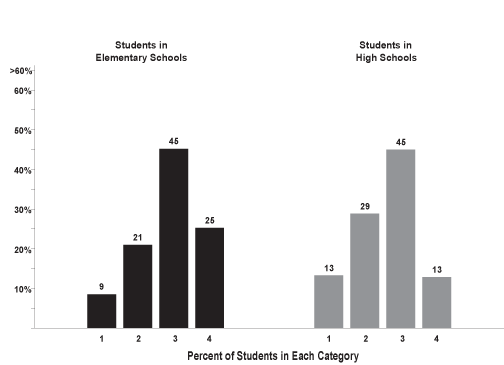Consortium on Chicago School Research
Snapshot 2003: Student-Teacher Trust
Students' perceptions about the quality of their relationships with teachers. High levels indicate that there is trust and open communication between students and teachers.

Definition of Categories Charted Above
Category |
In
Chicago Public Schools: |
1 No trust |
students
disagree that their teacher has a good reason for
telling them not to do something, cares about them and what they
think, does not get mad when they make mistakes, will always listen
to students' ideas, always tries to be fair, and makes them feel
safe and comfortable. Students disagree or strongly
disagree that their teacher does not punish students without
knowing what happened and keeps his or her promises. |
2 Minimal trust |
some
students agree and others disagree
that their teacher has a good reason for telling them not to do
something and cares about what they think. Students disagree
with all other items on the scale. |
3 Strong trust |
students agree that their teacher has a good reason for telling them not to do something, cares about them and what they think, does not get mad when they make a mistake, will always listen to their ideas, always tries to be fair, and makes them feel safe and comfortable. Some students agree and others disagree that their teacher does not punish students without knowing what happened and keeps his or her promises. |
4 Very strong trust |
students
strongly agree that their teacher has a good reason
for telling them not to do something, cares about them and what
they think, does not get mad when they make a mistake, will always
listen to their ideas, always tries to be fair, and makes them feel
safe and comfortable. Students agree or strongly
agree that their teacher does not punish students without
knowing what happened and keeps his or her promises. |
To see the items making up this measure and the response frequencies for each item, click here.
Back to the main Key Measures
of School Development page